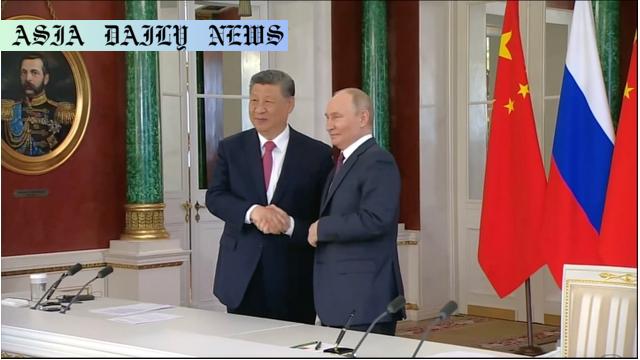Bilateral Relations: Putin and Xi aim to strengthen ties amidst global unilateralism while addressing the US and Ukraine situation.
- Putin and Xi met in Moscow to celebrate Victory Day and strengthen bilateral ties.
- They criticized unilateralism and highlighted the importance of multipolar world cooperation.
- Leaders focused on addressing US strategies and the Ukraine conflict.

Strengthening Bilateral Relations: Xi and Putin’s Strategic Meeting
In a critical geopolitical development, Russian President Vladimir Putin and Chinese President Xi Jinping convened in Moscow during a globally significant week, as Russia prepared to commemorate its annual Victory Day on May 9. This ceremonial occasion serves as a platform for reflecting upon historical alliances formed during World War II. Both nations recognize these alliances as cornerstones for the robust bilateral relations they aim to sustain amidst growing international uncertainties.
The meeting underscores the mutual emphasis placed on strengthening their diplomatic, political, and economic relations. As global giants, Xi and Putin reaffirmed their vision of fostering equal partnerships that withstand external pressures, particularly from the United States. Both leaders declared their steadfast commitment to supporting mutual interests and the advancement of the developing world through collaborative efforts in various economic and political arenas.
Addressing Unilateralism and Promoting a Multipolar World
At the core of their discussions was a shared concern over increasing unilateralism in global politics. Xi highlighted the growing challenges of international “bullying” and reiterated China’s dedication to working closely with Russia to counterbalance such trends. Together, they aim to champion economic globalization and promote an equitable, multipolar system where emerging economies and developing nations have a more significant voice in the global framework.
This approach reflects their shared standpoint that the dominance of a single superpower, namely the United States, should give way to a more balanced world order. By strengthening their political and economic collaboration, they aspire to inspire hope among smaller nations for a fairer and more inclusive international landscape.
Strategic Discussions on US Relations and the Ukraine Conflict
A considerable portion of Xi and Putin’s dialogue was devoted to addressing the evolving geopolitical challenges posed by the policies of the US administration and ongoing conflicts such as the situation in Ukraine. Their discussions signified a strategic alignment to address issues surrounding international security, national sovereignty, and global peace effectively.
With the specter of Western sanctions and diplomatic pressures looming, China’s support plays a crucial role in bolstering Russia’s stance amidst the Ukraine crisis. Xi’s engagement further represents China’s determination to balance its diplomatic relations while advocating for solutions that reflect its global strategic and moral interests.
Global Implications and Observations
As Xi prepares to attend the Victory Day military ceremony, the meeting between two of the world’s most influential leaders has captured global attention. Observers see it as a bold reminder of the enduring partnership between Russia and China, signaling their collective resilience against Western pressures. With a shared vision to safeguard their spheres of influence, Xi and Putin’s camaraderie stands as testimony to the evolving global power dynamics and its implications on international stability.



Commentary
A Historical Bond Reinforced
The meeting between Presidents Xi Jinping and Vladimir Putin is far more than a diplomatic exchange; it serves as a potent symbol of the historical ties shared between these two nations. By reflecting on alliances formed during World War II, they remind the world of the foundation upon which their contemporary friendship is built. This meeting comes as a critically timed statement, emphasizing camaraderie and unity when global tensions demand cohesion among geopolitical powerhouses.
The Pursuit of Multipolar Vision
Xi and Putin’s shared vision of a multipolar world challenges the existing unipolar dominance of Western powers. By speaking out against global unilateralism and advocating for the rights of developing nations, both leaders encapsulate a transformative doctrine that many nations could potentially rally behind. Their articulated positions are not just about challenging Western supremacy but carving out an inclusive world order built on equity and mutual respect.
Navigating Complex Global Relationships
While their partnership grows stronger, it also invites global scrutiny. The focus on building collaborative strategies to counter the West’s dominance and simultaneously addressing the challenges in Ukraine paints their relationship as a combination of strategic alignment and ideological solidarity. The global community will keenly observe how these discussions materialize in tangible actions and whether they will lead to a shift in the existing world order.
By rekindling historical alliances and asserting their shared goals, Xi and Putin chart a path forward that could reshape global politics. However, as ever, the question remains: can this bilateral approach withstand growing international challenges, or will it encounter roadblocks along the way?